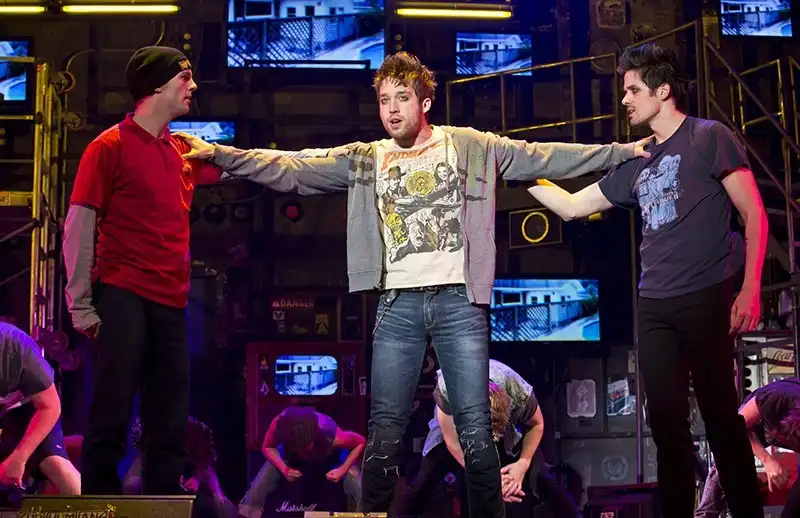Green Day’s American Idiot @ Kingsbury Hall 12.03
Art
Alright, I know what you’re thinking. Punk rock? On Broadway? Are you fuckin’ serious? Set aside your thoughts on whether or not Green Day is “punk.” Instead, let’s talk about the awesome spectacle that is American Idiot.
I definitely had my opinions stuffed in my pocket as I walked into Kingsbury Hall, and the smiling faces, families, and stuffy white folks all around me confirmed it—this was going to be laaaaaame. There I was, with my mother (hi mom!), on a frosty Tuesday night with the other white-bread folks, almost a little embarrassed to be a part of such a mainstream cultural phenomenon (so much for “underground”). But what followed took my pocket of opinions and coiled them tightly around my throat.
The speakers to the sides of the stage lit up. A tin-can radio voice announced that North Korea had successfully set off a nuclear bomb. My heart sank. Jesus, we’re all going to war, I thought before I realized it was part of the show. Soon, radio chatter clicked and popped to other sound-bites, a few audial clips summed up the culture in America before the curtain rose, revealing over a dozen televisions spread over a dingy grey back drop with old records and graffiti spread across it. To either side were members of a full band: a drummer, bass, two guitars and someone on synth and samples—very unusual for a musical.
The TVs were flashing bits of infomercials, news, flags and other classically American images before characters Johnny (Jared Nepute), Tunny (Dan Tracy), and Will (Casey O’Farrell) introduced themselves with a few masturbation jokes (I then realized this wasn’t a family show) and middle fingers to the crowd in classic punk-rocker fashion before the band launched into a sharp, punchy, and perfectly clear rendition of “American Idiot.”

The whole cast sprang into action with frantic head-banging dance moves, spectacular flashing lights that defied conventional color-wheels, images projected across the set to the rear, along with dozens of changing clips displayed across the various televisions. I picked my jaw up just long enough to crack a smile before the sensory overload settled down—for a few fine lines of dialogue—before Neptune blasted into the five-part piece “Jesus of Suburbia.”
Eventually, I realized that this show must have some sort of plot, and I started to pay closer attention. It’s a pretty simple story: three punk-rocker buddies all get bored of the small town they’re in so they decide to leave for the city. One (Will) knocks up his girlfriend and decides to stay home with her. The other two get to the city, though one (Tunny) has grandiose dreams of fighting in the war, so he joins the military.
Johnny falls for a saucy young tart and slips into excessive drug use after a dark part of his subconscious (symbolized by St. Jimmy, played by Daniel C. Jackson) keeps setting him up with great drugs and bad ideas.
While the musical performances by the band and the cast were excellent, and while the set, costume, and lighting designs were superb, the plot was a bit thin for my taste—the performance itself is about 90-percent songs with very little space for dialogue to fill in any of the gaps.
My guess is that the plot was deliberately left a bit thin because the lyrics to the songs themselves don’t always quite match up to what’s going on—it feels a bit like the plot was written around the songs rather than the other way around, which I’m fairly certain is the case.
This isn’t necessarily a problem because the plot does make sense and there weren’t any glaring holes, it’s just that in order to connect with some of the characters and to be truly moved by their songs, you’ve got to explore them more deeply. The most complex of the characters is certainly Johnny, whose broken home and daddy issues drive much of the conflict in his life, though even his character development stops a little short.
The only things we know about the other main men are that Tunny has weird-ass dreams that make him join the army (for no apparent reason), and that Will is a father who smokes tons of weed, which actually brings me to my next point. I mentioned this wasn’t exactly a family show, which is important because I completely expected something watered-down and built specifically to serve as many viewers as possible.
Instead, the performance had a lot more edge than I expected—there was ample (sometimes hilarious) use of all your favorite four-letter words, depictions of hardcore drug use that bring to mind scenes right out of Pulp Fiction, and even some almost-a-little-too-realistic imitated sex during one of the musical numbers (how that poor actor didn’t bust a nut right then and there is beyond me).

The edge didn’t feel out of place or forced, either, which can actually make a story much worse. It’s kind of hard to imagine a punk rock story being told without a few “fucks” and “shits” thrown in for realism, and the drug use made sense given the context.
Although the plot may have been written around songs that weren’t quite matched to it, in the end, none of that mattered. What really mattered was the audio and visuals, which could not have been better—there wasn’t an out-of-place light, rarely an off-key note, and every single performer was clearly having a blast on stage throughout every number. Every song from the American Idiot album was performed and each fit well enough with the plot, though some better than others.
Additionally, there were a few songs from the 21st Century Breakdown album, and even an outstanding encore featuring the whole cast, each with their own acoustic guitar (twelve total), performing a heartfelt rendition of “Time of Your Life” that drove the audience to a standing ovation.
American Idiot challenged my preconceptions from the moment it started and by the end, I couldn’t be happier I went on a musical trip from the highs and lows of a drug abuser, the sad, desperate life of a young father, and the shattered hopes of a young man intent on serving his country (even if we didn’t dig too deep).
The American dream for these young folks might never have happened, but at least I got to share their story on the way, and in the end, it didn’t matter that it was built on one of the most commercially accessible bands ever—what mattered most was that it fucking rocked. Whether or not you’re interested in whatever you want to call Green Day’s music, the American Idiot album was certainly built for Broadway and it was built into an impressive and fantastic piece of performance art unlike anything I’ve ever seen, or will likely see again for some time.

